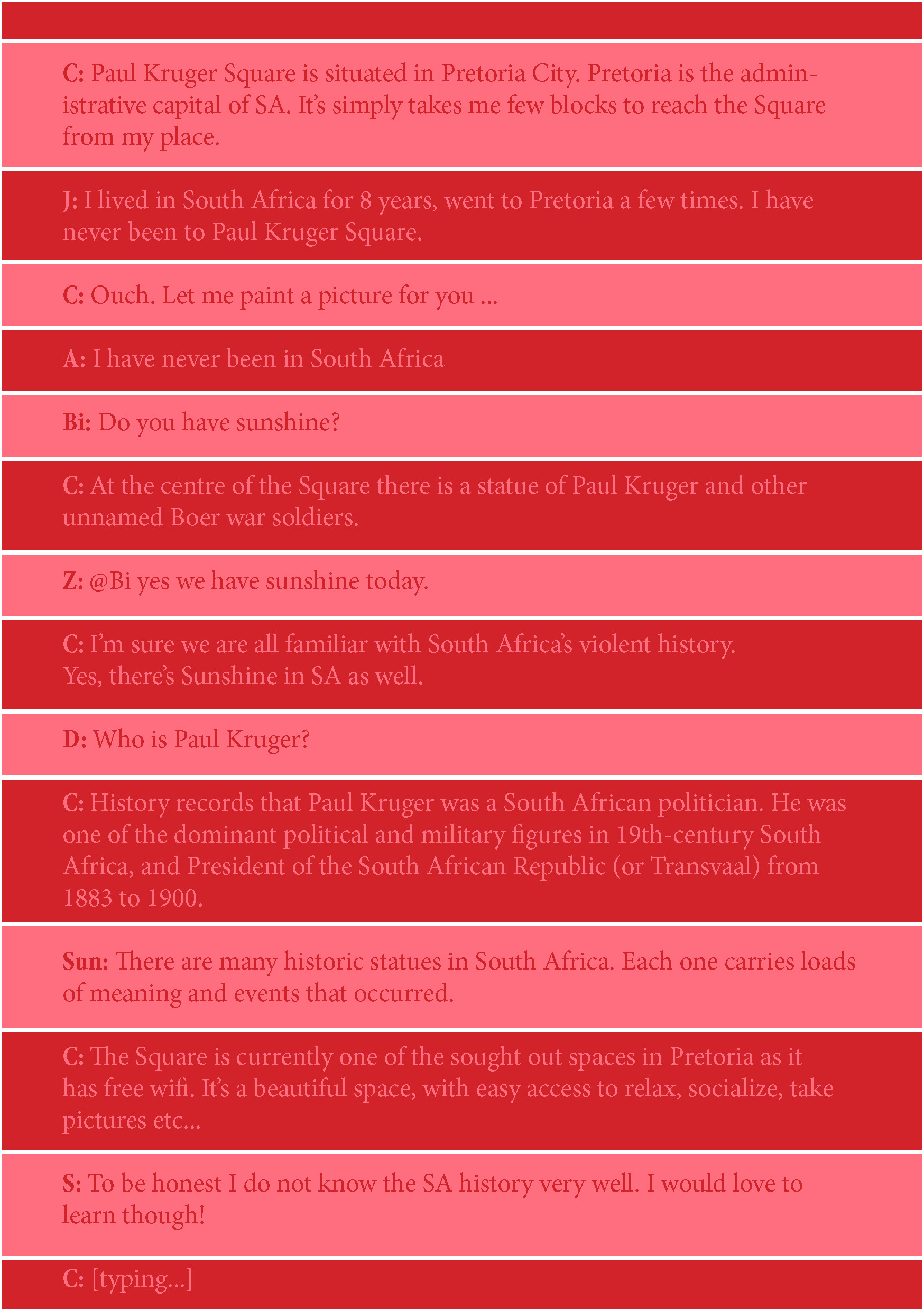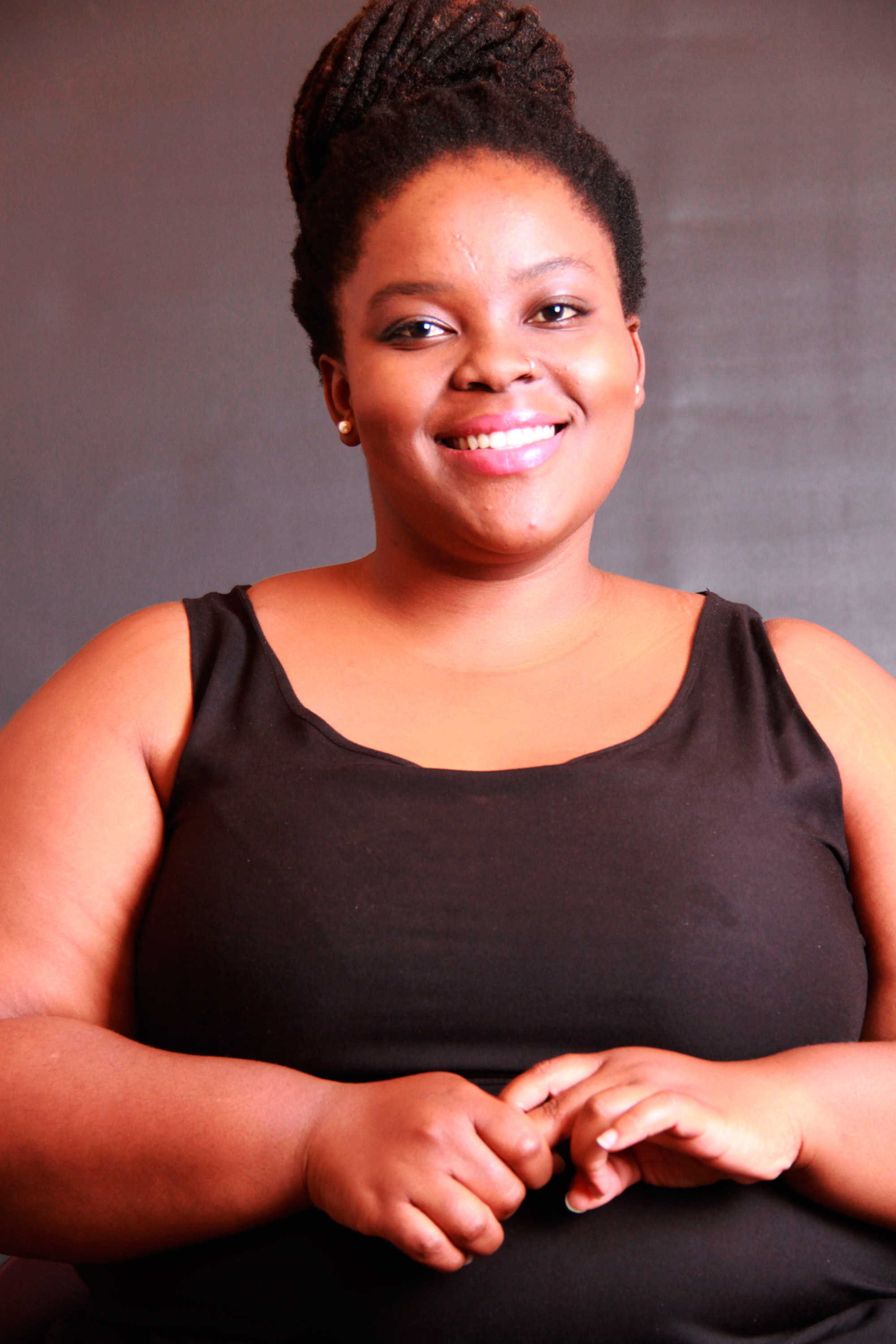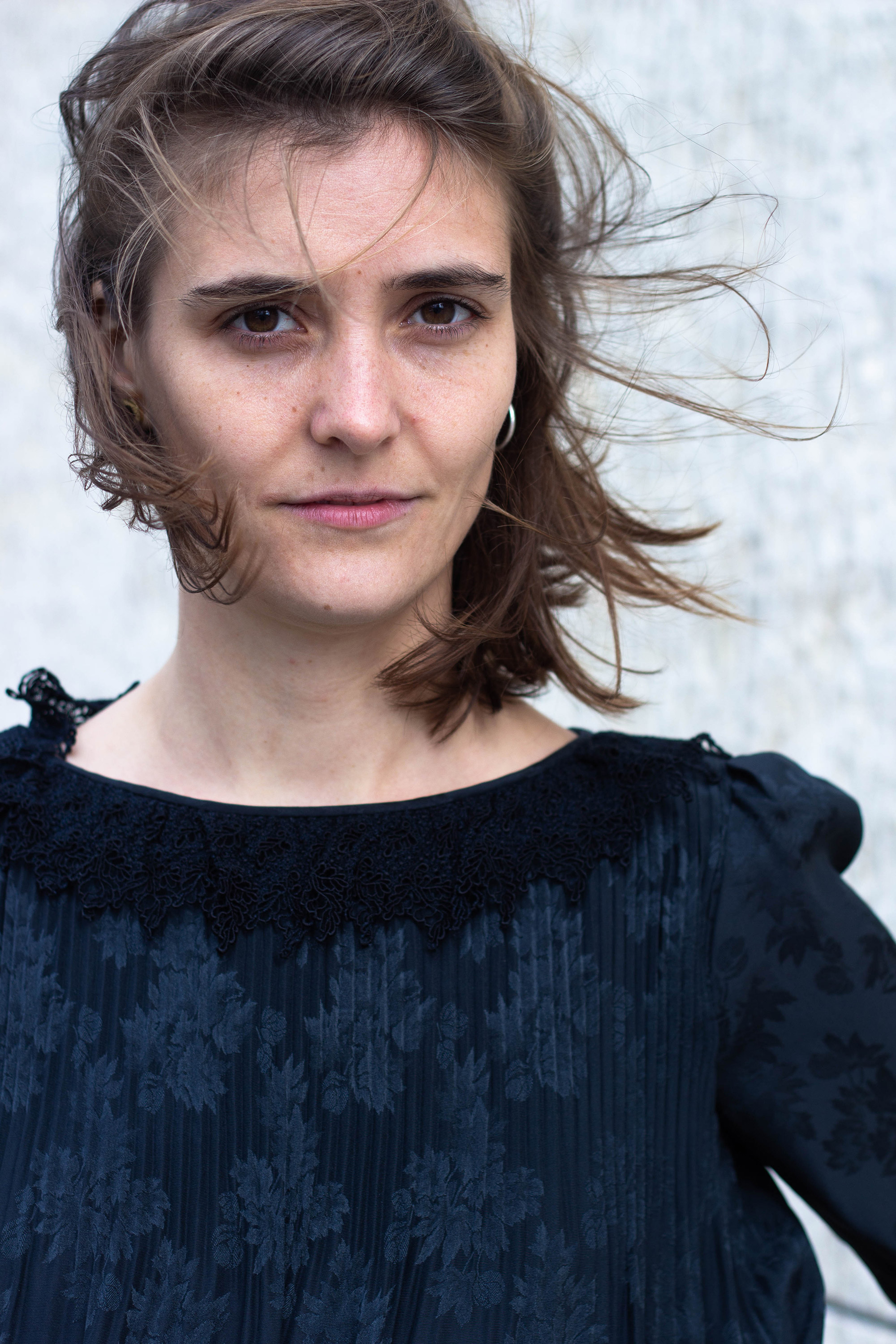City Space Movement
We all move through the city, we navigate the same paths. But not everyone perceives these places in the same way. Together with a group of local participants, the performative artists Bongile G. Lecoge-Zulu and Jasmin Schädler investigate the different perceptions of access to the common public space and the associated boundaries in the everyday meanders of Stuttgart and Johannesburg. They will stage guided tours and encounters with these cities, which will be presented in a unique publication and a cross-continental talk show, and will work out inner mapping.
A project of: Bongile G. Lecoge-Zulu & Jasmin Schädler
Interview with Bongile G. Lecoge-Zulu & Jasmin Schädler
and release of the publication within the framework of the festival opening on Tuesday, July 21, 9:30 pm
Place: Theaterhaus
 © First Virtual Promenade through Pretoria
© First Virtual Promenade through Pretoria21. – 26. Juli 2020, regularly, in different places
BONUS: LANGUAGE DISABILITY ACCESS
Johannesburg based theatre practitioner, educator, facilitator and activist Cherae Halley, shares her thoughts on language, disability and access as it pertains to Deaf communities South Africa.
BONUS: Walk to the Colonial Symbol
Performance artist Calvin Ratladi offers us an audio-visual presentation of the article he wrote for the City.Space.Movement map book. He promenades the streets of Pretoria to give audiences a glimpse of the Colonial monument of former president Paul Kruger.
21. – 26. Juli 2020, regelmäßig, an wechselnden Orten
Solar Queen – Conny Krieger & Rainer Idler (Stuttgart-Solar e.v.) (Intervention im öffentlichen Raum)
The queen is in town and she is looking for energy to keep her crown spinning, right round, right round. The sun is shining, the mirrors are focusing, the beams are hitting, the crown is turning.
Dress by courtesy of Justyna Koeke.
26. Juli 2020
Meeting Volks*theater Rampe Ensemble (Podcast auf Deutsch und Englisch)
On July 2, 2020 Bongile Lecoge-Zulu and Jasmin Schädler met with Volks*theater Rampe Ensemble. They are a group of residents and artists from the Southern part of Stuttgart’s city centre. Together they created the telephonic performance TAG Y that guides the visitor through this part of town while planned and contingent encounters occur. During the conversation with City.Space.Movement they talk about new discoveries in a known location and encounters sparked by the project and the collective research.
25. Juli 2020, 13:00 – 14:00 Uhr
Live-Drive mit Bongile Lecoge-Zulu (Live Stream auf Englisch @stuttgarterzeitung )
Live on Instagram @stuttgarterzeitung
Join Bongile around Johannesburg on Saturday 25th July at 1pm. She will navigate her usual routes around the city (and some new paths that may be discovered!) and share her thoughts of Joburg in some car-pool conversation.
24. Juli 2020
Jozi Stories with Drama for Life Playback Theatre - Episode 2
Drama for Life Playback Theatre Company was founded in 2008 and is the only accredited professional playback theatre company in Africa. The Drama for Life Playback Theatre Company is based in Johannesburg as part of Drama for Life Projects. Playback Theatre is an improvisational form of theatre based on the personal stories of audience members. In the course of a performance, a series of stories are spontaneously shared by volunteer tellers. Each story is then paired with a dramatic enactment ( by the conductor, actors/dancers, and musician) inspired by the particular text, mood and images inherent in the ‘just-told’ narrative.
The team opens up its weekly rehearsal for Die Irritierte Stadt audiences to share in two short episodes where they explore City.Space.Movement’s theme of routes, routines and city access.
23. Juli 2020
Meeting Peter Luttringer (Podcast)
On July 3, 2020 Jasmin Schädler met Peter Luttringer. They conversed and moved through Stuttgart together. Peter Luttringern works for Nikolauspflege, a centre of competence for people with visual disability that was founded in Stuttgart more than 160 years ago. He himself can differentiate between contrasts but cannot see colors – one of many different variants of visual disability. During a two hour conversation the two talked about accessibility and investigated the available orientation and guidance structures for people with visual handicaps in the city space.
Wasserlandschaften
18:00 – 20:00 Uhr
Meetingpoint: Sprudler at Feuersee
Registration at irritiertestadt.de/anmeldung
WASSERLANDSCHAFTEN, Stadtwanderung durch die Mythologie des Wassers – LaFuchsiaKollektiva e.V. (Radio Play Exhibition in German)
Wasserlandschaften (water landscapes) invites promenading listeners to follow the flow of water in the city of Stuttgart. More than 250 fountains can be found in the public space of Stuttgart. This tour features 16 of them in connection with water mythologies from all around the world. Myths and stories, embellished by children from Stuttgart, invite the listener into a flowing journey through the city. It is recommended to walk from one fountain to the next while listening to each episode. Magda Agudelo, one of the artists of LaFuchsiaKollektiva, extends an invitation to embark on this journey collectively on July 23.
https://www.lafuchsiakollektiva.de/
lafuchsiakollektiva@gmail.com
23. – 25. Juli 2020, durchgängig, Facebook, Instagram or call +49 1520 5293423
Surrounding the City (Performance mit live Updates auf Social Media)
During three days of the festival (23. – 25. Juli 2020), Mohammad Younes and Jasmin Schädler will walk along the borders of Stuttgart. They will cover a distance of approximately 72 km. The outlines of the area of Stuttgart are the limits to a person’s possibilities of residence (Wohnsitzauflage) during the asylum procedure. They are only allowed to move if they find an occupation of at least 15 hours a week in the respective area. Family members living in another area or better options for advanced training are not applicable.
It is possible to connect with the two performers during the three days. If you happen to live on the borders of Stuttgart, please get in touch.
22. Juli 2020
Experiencing movement through access: Public transport in Johannesburg – Katleho Sera (Essay in English)
The anthropologist Katleho Sera gives the reader a glimpse of local transportation in Johannesburg. How accessible are taxis and taxis ranks? What strategies are used to cope with moments of limited accessibility? Based on interviews and personal experiences Katleho Sera carves out the meaning of the body as a signifier in public space.
Jozi Stories with Drama for Life Playback Theatre - Episode 1
Drama for Life Playback Theatre Company was founded in 2008 and is the only accredited professional playback theatre company in Africa. The Drama for Life Playback Theatre Company is based in Johannesburg as part of Drama for Life Projects. Playback Theatre is an improvisational form of theatre based on the personal stories of audience members. In the course of a performance, a series of stories are spontaneously shared by volunteer tellers. Each story is then paired with a dramatic enactment ( by the conductor, actors/dancers, and musician) inspired by the particular text, mood and images inherent in the ‘just-told’ narrative.
The team opens up its weekly rehearsal for Die Irritierte Stadt audiences to share in two short episodes where they explore City.Space.Movement’s theme of routes, routines and city access.
21. Juli 2020
A sounding conversation between Johannesburg & Stuttgart
Together with the composer João Renato Orecchia Zúñiga who has lived in Stuttgart and Johannesburg, Bongile Lecoge-Zulu and Jasmin Schädler create a conversation between the two cities. Quotidian sounds are woven into a dialogue between two cities that could not be more different – yet their sounds are not always oppositional. Johannesburg is the largest city of South Africa and ranks 26th in the world’s largest urban areas with almost 14 million people. Stuttgart as a metropolitan region counts 5,3 million inhabitants and ranks 222nd.
João Renato Orecchia Zúñiga:
“It seems – to me – almost absurd to compare Johannesburg and Stuttgart, yet the auditory worlds, the sound recordings, drive me to do just that. The two cities exist in my personal experience, spread across decades and continents, and yet I want to look at them like a scientist, make some attempt at objectivity. Movement is more than arriving at point-B from point-A; it is change, it is being in two places at once, balancing memory and anticipation, it is ageing, whether by minutes, hours, or years. I am not the same as when I left, and I will be different again when I finally arrive.
I find it interesting to reflect on the difference between the sound recordings I received from Bongile and Jasmin. One can immediately sense the difference in how the cities are navigated. While one can walk around Stuttgart with a field recorder, through crowded places and relatively empty spaces, in Johannesburg one must carefully consider what kinds of spaces are “safe”. Added to the “normal” considerations around safety in a city like Johannesburg, comes the national lockdown regulations, among the strictest in the world at the moment, as well as the health considerations of the Covid-19 virus itself in relation to how Johannesburg is navigated.
In order to include aspects of Johannesburg that are not easily accessible in the current situation, I added some audio recordings from my own archive. These recordings are from approximately 2008 – 2014, and this, for me, added another layer of movement to the framework of the resulting sound work – time travel.
Twenty years ago, nearly to the day, I arrived in Stuttgart. Just 22 years old, couldn’t have imagined what my life would become, where it would lead me. Thanks to google maps, I could find the address of where I lived in Stuttgart for two months – I had long forgotten any details – and Jasmin went there, took some photos and audio recordings. I am retracing the steps of my younger self, through Stuttgart, leading towards Stuttgart and away from it again, forming a long line of memory and anticipation.”
Informationen zu City Space Movement
- Bongile G. Lecoge-Zulu and Jasmin Schädler would like to carry out their project together with private individuals as “artistic collaborators”. City Space Movement is conceived as an instrument with which new approaches to one’s own city can be found in order to conquer new perspectives on the city without prejudice. The concept “city” is not intended to be criticized or even questioned. Rather, the creative goal of the two artists is to make their views of the topic “city” and especially the peculiarities of a particular city accessible to others. In their project, they therefore pay particular attention to the everyday paths of the participating private individuals and how they cope with everyday tasks on their paths.
Bongile G. Lecoge-Zulu and Jasmin Schädler trace the inner and outer mapping of a city and its inhabitants with newly interpreted choreographic means. They question the way people meet in a city. Against this background they hope for a great diversity of the spectrum of participants.
In essence, the catalogue of questions consists of four elements:
- What experiences have you had with your city?
- What do you like best about your city?
- What are your barriers/restrictions for access to the city (if any)?
- How do you navigate around these barriers and the city in general?
Bongile Lecoge-Zulu
studied music and the humanities (BMus hons & MA) at the University of the Witwatersrand in Johannesburg. She also has a flute performance Licentiate from the Royal Schools of Music. She teaches flute and singing at Brescia House School and at St. Stithians Girl’s College in Johannesburg. The artist works in the disciplines of music and theater pedagogy, facilitation, performance, writing and curating. She has performed in ensembles and theaters across South Africa and Botswana. Lecoge-Zulu is involved in interdisciplinary artistic movements in which she explores ways of merging music and other forms of artistic expression. Currently, much of her collaborative exploration is housed at the Centre for the Less Good Idea. Her major works include the tribute musical “Divas of Kofifi” and the creation of “Dear Mr Government” among others. Through her work and full-time membership of the Drama for-Life-Playback Theater Company, she deals with issues of social justice in a variety of ways. Her work has been featured at numerous national and global festivals and conferences.
 © Siphumeze Khundayi
© Siphumeze KhundayiJasmin Schädler
was born in Illertissen in 1989. After completing her bachelor’s degree in physics and cultural studies, she studied theater directing at the Academy of Performing Arts Baden-Württemberg and in the master art practice at the Dutch Art Institute. Her artistic work moves between performance and installation. Her current focus is on the relationship between space, perception and identity in both analog and digital. In doing so, she deals with data collection, reporting and the questioning of conventions of knowledge production from an intersectional perspective.
She is a founding member of the performance collective die apokalyptischen tänzerin*nen (apocalypse.dance), as well as a founding and board member of the association InterAKT Initiative eV, which realizes music and performance projects in the Stuttgart area (interakt-initiative.com).
In 2020 she is a fellow at Kunststiftung Baden-Württemberg. She has been a studio scholarship holder at the Künstlerhaus Stuttgart since 2019. Januar 2025/2017 she was a fellow at Akademie Schloss Solitude. Jasmin Schädler lives and works in Stuttgart.
 © Julia Schäfer
© Julia Schäfer